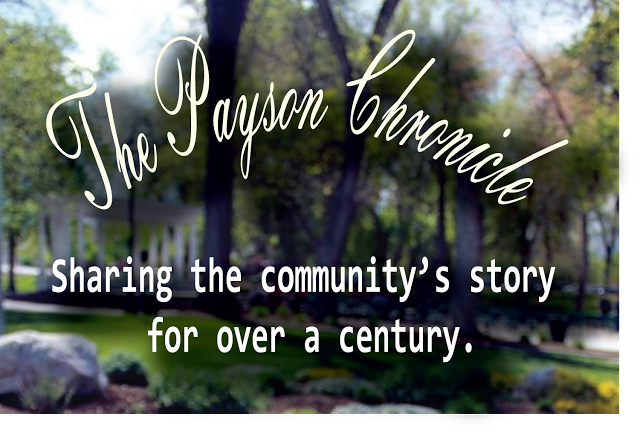 |
| Pictured beside his patrol truck, Payson Police Lt. Bill Wright serves as director and teacher of the N.O.V.A. program in Payson. |
With its mascot Polaris a beacon to follow, youth engage in lessons designed to instill positive action in N.O.V.A. classes taught at schools throughout Payson and beyond.
Since the program began locally six years ago, it has received a warm response from its participants and stakeholders, as students gain skills that lend promise to their role as North Stars--guiding lights for peers to follow--through life.
The program continues to succeed thanks to the caring leadership of local law enforcement.
N.O.V.A. was developed in Utah County in 2003 by law enforcement officials and counselors who had been directing Drug Abuse Resistance Enforcement (D.A.R.E.) classes at Utah schools.
D.A.R.E. was founded in Los Angeles in 1983 as a preventative approach to guide youth away from substance abuse, violent gangs and behaviors, and grew to become a program taught worldwide. Changes to D.A.R.E. were afoot in 2003, according to Payson Police Lieutenant Bill Wright, who had served as D.A.R.E. director and instructor in Payson, a shift that prompted Orem Police Sergeant Charlie Wakamatsu and Dr. Paul Jenkins, a child and family psychologist, to seek out an alternative that might better suit the local Utah Valley culture.
“I saw the changes,” said Wright, who noted that he thinks that the D.A.R.E. program remains a valuable resource to those communities that continue to employ it. “It’s still a very good program.”
Sgt. Wakamatsu first approached Orem City Police Department’s chief with his concerns, and then sought out to find a program to abide more closely with the characteristics of Utah County.
“He went out to find something that was better,” said Wright, “but could not find anything that was better than the current D.A.R.E. program.”
Next option? Create something new.
Sgt. Wakamatsu and Dr. Jenkins formulated a program that would incorporate positive attributes and values into its curriculum. They created N.O.V.A. based on the principles of “Nurturing youth to seek out positive Opportunities, internalize good Values, and to accept Accountability for their choices in life,” and, with the help of officers from the Orem Police Department, began implementing it in Orem and north Utah County schools that had previously taken part in D.A.R.E.
While Lt. Wright had found D.A.R.E. to be effective, he was impressed by the emphasis N.O.V.A. placed on values he says are connected to the local community. But rather than adopt the program immediately, he waited patiently to see how N.O.V.A. would develop. Watching its workings during its first two years and meeting with Orem officers and educators provided him with enough insight to make a decision.
“I was very impressed with it,” Wright said.
After noticing the benefits, Wright contacted then-Payson Police Chief Tom Runyan about adopting N.O.V.A., as well as local grade school administrators with whom he worked and those in Orem who had the vantage point of having become familiar with both programs. Once he was certain the change would be for the better, Wright jumped on board, with the Payson Police Department’s consent, and underwent the training required to teach the program in Payson schools and take the reins as its first local director.
Employing a different theme each week, officers, including Wright, enter a classroom for an hour at a time, with the class’s teacher present. The lessons range from building self-esteem among the youth to discerning between positive and negative messages broadcast through media in the forms of video games, the internet, and music, matters important to youth today.
Wright employs a personal approach to teaching, one that he learned from an old instructor.
“What I tell my NOVA students is that I’m not going to teach them anything,” he said. “I had a professor tell me that once in college, and I was paying a lot of money for that professor to come and tell me ‘I’m not going to teach you anything,’ so I started thinking, ‘Well, what good are you?’ And then he said, ‘What I am going to do is give you information and you’re going to teach yourself.’”
His doubts turned to certainty with the wisdom of time. He shares the autonomy building approach today, one that allows others to come to their own conclusions with the material he shares.
While he oversees Park View Elementary courses, as well as a seminar for Payson Junior High students, Animal Control Officer Phil Christensen teaches N.O.V.A. at Taylor Elementary School, Officer Jay Hurst at Spring Lake Elementary, Officer Mark Bell at Barnett Elementary, and Officer Mike Bastian at Wilson Elementary School.
Wright recently oversaw the the graduation of 6th-grade N.O.V.A. students at Park View, one of many commencements past and future. Reflecting on his involvement, he noted that the benefits are hard to measure. However, the investment is worthwhile.
“These kids are our future,” he said.





No comments:
Post a Comment
Note: Only a member of this blog may post a comment.